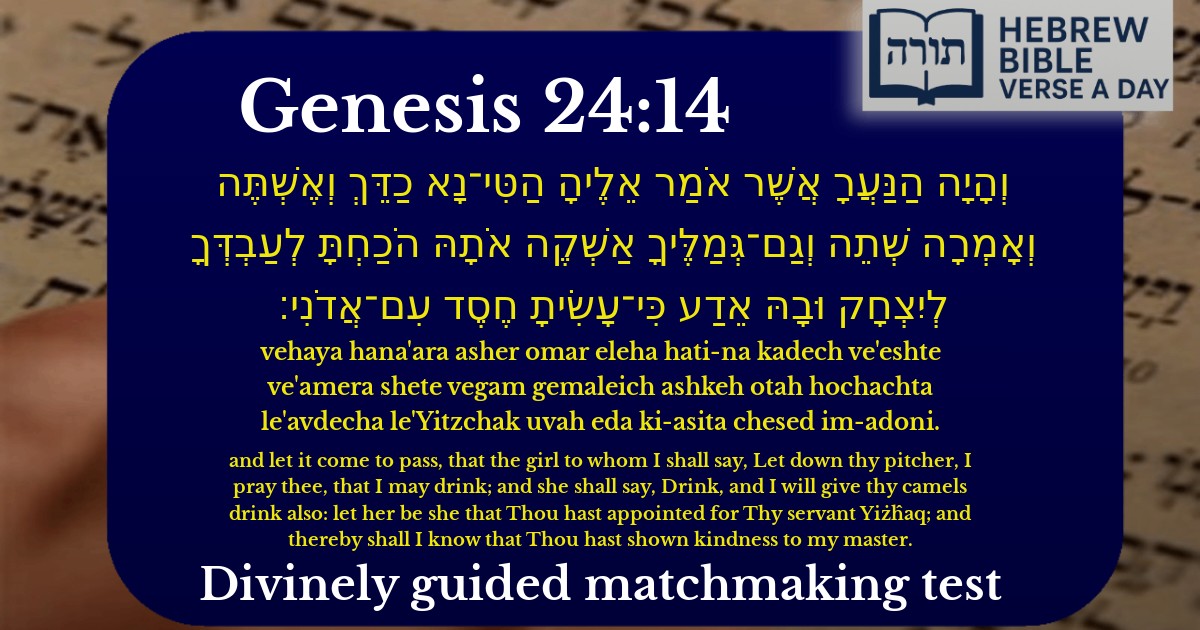Join Our Newsletter To Be Informed When New Videos Are Posted
Join the thousands of fellow Studends who rely on our videos to learn how to read the bible in Hebrew for free!
Hebrew Text
וְהָיָה הַנַּעֲרָ אֲשֶׁר אֹמַר אֵלֶיהָ הַטִּי־נָא כַדֵּךְ וְאֶשְׁתֶּה וְאָמְרָה שְׁתֵה וְגַם־גְּמַלֶּיךָ אַשְׁקֶה אֹתָהּ הֹכַחְתָּ לְעַבְדְּךָ לְיִצְחָק וּבָהּ אֵדַע כִּי־עָשִׂיתָ חֶסֶד עִם־אֲדֹנִי׃
English Translation
and let it come to pass, that the girl to whom I shall say, Let down thy pitcher, I pray thee, that I may drink; and she shall say, Drink, and I will give thy camels drink also: let her be she that Thou hast appointed for Thy servant Yiżĥaq; and thereby shall I know that Thou hast shown kindness to my master.
Transliteration
Vehaya hana'ara asher omar eleha hati-na kadech ve'eshte ve'amera shete vegam gemaleich ashkeh otah hochachta le'avdecha le'Yitzchak uvah eda ki-asita chesed im-adoni.
Hebrew Leining Text
וְהָיָ֣ה הַֽנַּעֲרָ֗ אֲשֶׁ֨ר אֹמַ֤ר אֵלֶ֙יהָ֙ הַטִּי־נָ֤א כַדֵּךְ֙ וְאֶשְׁתֶּ֔ה וְאָמְרָ֣ה שְׁתֵ֔ה וְגַם־גְּמַלֶּ֖יךָ אַשְׁקֶ֑ה אֹתָ֤הּ הֹכַ֙חְתָּ֙ לְעַבְדְּךָ֣ לְיִצְחָ֔ק וּבָ֣הּ אֵדַ֔ע כִּי־עָשִׂ֥יתָ חֶ֖סֶד עִם־אֲדֹנִֽי׃
וְהָיָ֣ה הַֽנַּעֲרָ֗ אֲשֶׁ֨ר אֹמַ֤ר אֵלֶ֙יהָ֙ הַטִּי־נָ֤א כַדֵּךְ֙ וְאֶשְׁתֶּ֔ה וְאָמְרָ֣ה שְׁתֵ֔ה וְגַם־גְּמַלֶּ֖יךָ אַשְׁקֶ֑ה אֹתָ֤הּ הֹכַ֙חְתָּ֙ לְעַבְדְּךָ֣ לְיִצְחָ֔ק וּבָ֣הּ אֵדַ֔ע כִּי־עָשִׂ֥יתָ חֶ֖סֶד עִם־אֲדֹנִֽי׃
🎵 Listen to leining
Parasha Commentary
📚 Talmud Citations
This verse is quoted in the Talmud.
📖 Chullin 95b
The verse is referenced in a discussion about the signs Eliezer sought for identifying the right wife for Isaac, illustrating divine providence in matchmaking.
📖 Ta'anit 4a
Mentioned in the context of discussing prayers and how God answers the righteous, using Eliezer's prayer as an example of a prayer that was answered directly.


Context of the Verse
This verse (Bereshit 24:14) is part of the narrative where Eliezer, Avraham’s servant, is sent to find a wife for Yitzchak. Eliezer devises a test to identify the appropriate match, asking Hashem for a sign that the chosen woman will demonstrate extraordinary kindness—not only offering him water but also volunteering to water his camels.
Eliezer’s Criteria for a Worthy Wife
Rashi explains that Eliezer sought a woman who embodied the trait of chesed (loving-kindness), a defining characteristic of Avraham’s household. The test was not arbitrary but designed to identify someone whose natural inclination mirrored the values of Avraham’s family. The Midrash (Bereshit Rabbah 60:5) elaborates that Rivka’s response demonstrated her exceptional generosity, as watering ten camels was no small feat.
The Significance of the Test
Rivka’s Exceptional Character
The Talmud (Ta’anit 4a) connects Rivka’s actions to the broader concept of zechut avot (merit of the ancestors), suggesting that her behavior was a fulfillment of the Divine plan rooted in Avraham’s righteousness. The Kli Yakar adds that Rivka’s willingness to serve both Eliezer and his camels—strangers to her—showed her innate humility and selflessness, qualities essential for building the future of Klal Yisrael.
Lessons in Hashgacha Pratit (Divine Providence)
Malbim highlights how this episode illustrates hashgacha pratit—Hashem’s direct involvement in guiding events to ensure the continuity of Avraham’s lineage. Eliezer’s specific request and Rivka’s precise response were orchestrated to confirm that she was the destined partner for Yitzchak.